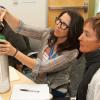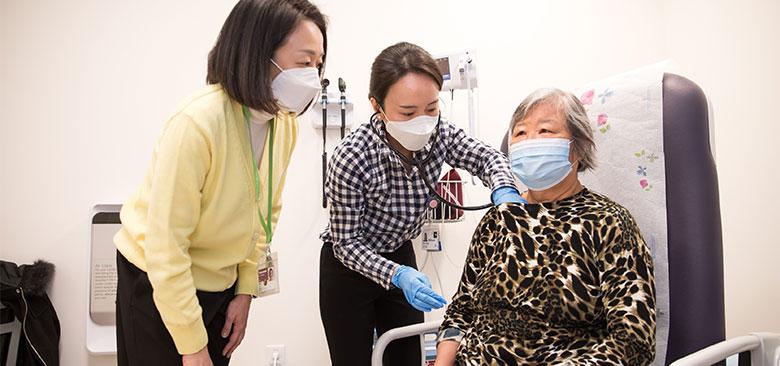
Yoonmee Joo (left), assistant clinical professor in the Adult Gerontology Primary Care Nurse Practitioner specialty, precepts master's student Ellen Park Chang as she provides care to patient Lini Xu at the Center for Elders Independence in Oakland, CA.
Amid a Geriatrician Shortage, Nurses Answer the Call
Baby boomers will again cause a shift in America’s demographics when the year 2030 arrives.
That generation will be age 65 or older by then, and the number of older people is projected to increase 55%. One in five people will be hitting an age when health problems may begin emerging.
America isn’t fully prepared to meet the challenge.
About 7,000 certified geriatricians are practicing today, but the American Geriatrics Society estimates needing as many as 30,000 by 2030 to meet the upcoming health care demands.
Geriatric care encompasses health conditions that are complex and unique to older adults, ranging from chronic diseases to cognitive issues, and different approaches are needed to manage their health.
The UCSF School of Nursing is working to boost the workforce of trained health care professionals by preparing advanced practice nurses to diagnose, treat and advocate for the complex health needs of older adults. Through its Master of Science program, the School provides specialized training in adult gerontology with a rigorous two-year curriculum that combines extensive didactic courses and clinical residencies.
Adult Gerontology Primary Care Nurse Practitioner Specialty
The Adult Gerontology Primary Care Nurse Practitioner (AGPCNP) specialty prepares nurse practitioners to deliver comprehensive care for diverse, high-risk populations in community and hospital-based primary care clinics, skilled nursing facilities, and patients’ homes.
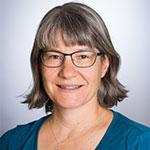 Helen Horvath Students in this specialty learn to diagnose, treat and manage the long-term health care of adults and older adults who have multiple comorbidities, a common experience for this population, said Helen Horvath, an associate clinical professor in AGPCNP. As part of the curriculum, the students learn the importance of individualized decision-making in preventive care for older adults, receive in-depth training in palliative care, and master the skills to be able to promote good health practices and maintenance. In addition, many students take additional coursework in geriatric psychiatric care.
Helen Horvath Students in this specialty learn to diagnose, treat and manage the long-term health care of adults and older adults who have multiple comorbidities, a common experience for this population, said Helen Horvath, an associate clinical professor in AGPCNP. As part of the curriculum, the students learn the importance of individualized decision-making in preventive care for older adults, receive in-depth training in palliative care, and master the skills to be able to promote good health practices and maintenance. In addition, many students take additional coursework in geriatric psychiatric care.
In conjunction with the didactic coursework and clinical rotations, second-year students can also participate in the NP Geri Scholars (NPGS) program where they train alongside physicians in UCSF’s geriatric medicine fellowship, psychiatry fellows and others in an interprofessional setting at the San Francisco VA Medical Center. The year-long series includes lectures and interactive discussions on topics, such as geriatric eye diseases, hearing loss and nursing home care, from renowned clinicians and researchers in the field.
“All of our AGPCNP students learn about these important topics, but our NP Geri Scholars take a deeper dive into these issues and build a deeper understanding that helps them provide quality patient care,” said Horvath, who oversees the NPGS program.
Adult-Gerontology Clinical Nurse Specialist Specialty
The School also trains clinical nurse specialists to become experts in geriatric care through its Adult Gerontology Clinical Nurse Specialist (AGCNS) specialty.
The specialty prepares graduate nursing students to manage the health of vulnerable adult and older adult populations from wellness through acute care. They emerge as valuable resources and consultants to fellow health care professionals, and take on roles which may include managing large programs and incorporating evidence into practice. Subspecialty options are offered in oncology, and in critical care and trauma.
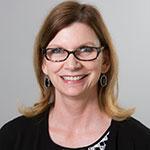 Lynda Mackin A course that typifies the program is “Common Problems in Older Adult Cancer Care.” This training is key because the majority of cancers are diagnosed at age 65 and older, said Lynda Mackin, who leads the AGCNS specialty.
Lynda Mackin A course that typifies the program is “Common Problems in Older Adult Cancer Care.” This training is key because the majority of cancers are diagnosed at age 65 and older, said Lynda Mackin, who leads the AGCNS specialty.
The course takes a holistic approach in delivering care. Along with determining if chemotherapy is needed, nurses learn to manage cancer-related symptoms and to address patients’ physical and mental health.
“With older adults, you just can’t focus on the illness,” Mackin said. “You must also look at how they get through their daily life.”
This includes assessing if a patient can manage their own finances. If they can’t, it may mean arranging for someone to take over finances, Mackin said. They may also need help preparing meals, getting dressed, feeding themselves, and getting out of bed.
For those 85 and older, “the oldest of the old,” she said, maintaining independence can be just as important as finding treatments less burdensome than chemotherapy.
For students, understanding the complex needs of older adults is a critical part of the care delivery.
Graduate Cheryl Dankiewicz, MS ’17, now works as a geriatric CNS at Kaiser Permanente Vallejo Medical Center, where she helps nurse colleagues work with older patients who have dementia and delirium.
The clinical rotations and clinical conferences that Dankiewicz took part in at UCSF gave her a “look at things from a different perspective,” she said. In one eye-opening experience, she facilitated an advance care planning discussion with an older hospitalized patient who did not have social support. Though challenging as a new CNS student, it was an important experience to differentiate between her prior role as a staff nurse and what would be expected as a future CNS.
The conversation helped her overcome her nervousness about a difficult topic, Dankiewicz said, and reinforced how rewarding a career as a geriatric CNS can be.
Adult-Gerontology Acute Care Nurse Practitioner Specialty
In the Adult-Gerontology Acute Care Nurse Practitioner (AGACNP) specialty, students train to deliver quality care to patients facing chronic complex illnesses and critical illnesses in hospitalized patient settings. These include internal medicine, transplant, cardiology, neurosurgery, oncology, trauma and the emergency department. Didactic courses cover symptom assessment and management, acute and chronic illnesses, palliative care and more while clinical residencies provide hands-on training to apply these skills.
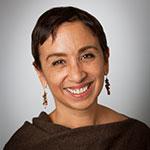 Rosalie Bravo Both AGACNP and AGCNS students take a disease management course series. Care of older adults is integrated into each presented topic. Among these courses, “Diagnostic and Therapeutic Interventions” is especially important because students learn to evaluate undifferentiated symptoms in older adults that may present diagnostic challenges, said Rosalie Bravo, professor and specialty lead for the AGACNP specialty.
Rosalie Bravo Both AGACNP and AGCNS students take a disease management course series. Care of older adults is integrated into each presented topic. Among these courses, “Diagnostic and Therapeutic Interventions” is especially important because students learn to evaluate undifferentiated symptoms in older adults that may present diagnostic challenges, said Rosalie Bravo, professor and specialty lead for the AGACNP specialty.
Older adults may have chronic illnesses, communication barriers due to cognitive decline, immobility, and medications that obscure the diagnostic landscape. For example, older adults may arrive at the hospital with vague complaints such as weakness. When evaluating older adults, the advanced practice nurse must consider infections in the absence of fevers, and cardiac ischemia in the absence of chest pain. Such diagnostic challenges often result in older adults getting admitted, longer hospital stays, and more diagnostic testing, Bravo said.
By building a deep understanding of these challenges, students in the AGACNP specialty learn to formulate differential diagnosis for these patients, enabling older adults to get the care they need.
A Drive to Improve Care for Older Adults
Mitchel Erickson, a volunteer associate clinical professor who supports the AGACNP specialty and is also a student in the Doctor of Nursing Practice (DNP) program, is focusing his scholarly DNP project on improving care for older adults.
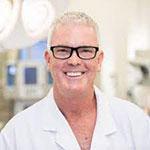 Mitchel Erickson As a certified acute care nurse practitioner in UCSF’s age-friendly emergency department, Erickson has witnessed hurdles with medication reconciliation for older patients. For his DNP project, Erickson seeks to develop a structured system for obtaining an accurate prescription history for older patients’ and examine their medication self-management challenges upon entering the ED.
Mitchel Erickson As a certified acute care nurse practitioner in UCSF’s age-friendly emergency department, Erickson has witnessed hurdles with medication reconciliation for older patients. For his DNP project, Erickson seeks to develop a structured system for obtaining an accurate prescription history for older patients’ and examine their medication self-management challenges upon entering the ED.
“It’s important to have an accurate record of what prescriptions and over-the-counter medications older patients are taking so they don’t experience problems from duplicate or non-recommended medications. These problems can lead to unnecessary ED revisits and rehospitalization,” he said. “The goal is to reduce avoidable ED visits for our patients.”


